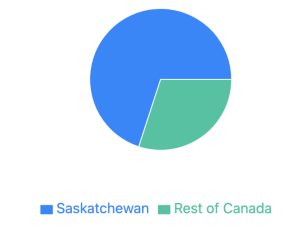Key Takeaways
- Chickpea harvest up by 31%
- Field pea harvest nearly complete, up 8%
- Lentil harvest 95% complete, up 5% year-on-year
- Heat poses risks to storage and quality
- Crop quality varies due to inconsistent rainfall

Saskatchewan, Canada's pulse powerhouse, is reporting a largely positive harvest for 2024. As one of India's main pulse suppliers, the province's agricultural performance has significant implications for global trade. Let's break down the latest data and what it means for market participants.

Harvest Progress and Yields
Chickpeas: A Standout Performer
Chickpea harvest has seen a remarkable 31% increase, with two-thirds of the crop already harvested. This substantial growth could lead to increased supply and potentially more competitive pricing in the global market.
Field Peas: Steady Growth
The field pea harvest is almost complete, showing an 8% increase compared to last year. This steady growth indicates a reliable supply for importers and processors.
Lentils: Consistent Progress
Lentil harvest is 95% complete, with a 5% year-on-year increase. This consistent performance maintains Saskatchewan's position as a key player in the global lentil trade.

Challenges on the Horizon:
Heat
While the warm weather has facilitated a speedy harvest, it also poses risks:
- Equipment stress due to high temperatures
- Potential quality issues in stored grains
- Farmers are closely monitoring storage conditions to mitigate these risks
Rainfall Variability Impacts Quality
The growing season since June has seen scattered rainfall, leading to:
- Variations in crop yield and quality across different areas
- Some regions reporting good quality crops
- Others experiencing challenges such as light bushel weights and small seed sizes
Market Implications
- Supply Dynamics: The increased harvest across all pulse types suggests a potentially strong supply from Saskatchewan this year. This could influence global pulse prices, particularly for major importers like India.
- Quality Considerations: Buyers should be aware of the quality variations. While some areas report good quality, others may offer pulses with lighter weights and smaller sizes. This variability could affect pricing and require more careful quality assessments during procurement.
- Storage and Logistics: The hot weather adds complexity to storage and transportation. Buyers might need to factor in potential quality preservation costs or seek assurances about storage conditions.
- Market Opportunities: The increased supply, particularly in chickpeas, could open up new opportunities for processors and traders to secure larger volumes or negotiate favorable terms.
- Risk Management: The varied quality outcomes underscore the importance of robust quality checking processes and potentially the use of forward contracts to secure specific quality grades.

Conclusion
Saskatchewan's 2024 pulse harvest presents a mixed picture of opportunities and challenges. While the increased yields across chickpeas, field peas, and lentils are promising for global supply, the quality variations and heat-related risks require careful consideration.
For traders, processors, and other stakeholders in the pulse industry, this situation calls for:
- Vigilant quality monitoring
- Flexible procurement strategies
- Close communication with suppliers about storage conditions
- Potential exploration of new market opportunities given the increased supply
As always, staying informed about these evolving conditions will be key to making smart trading decisions in the dynamic global pulse market.
